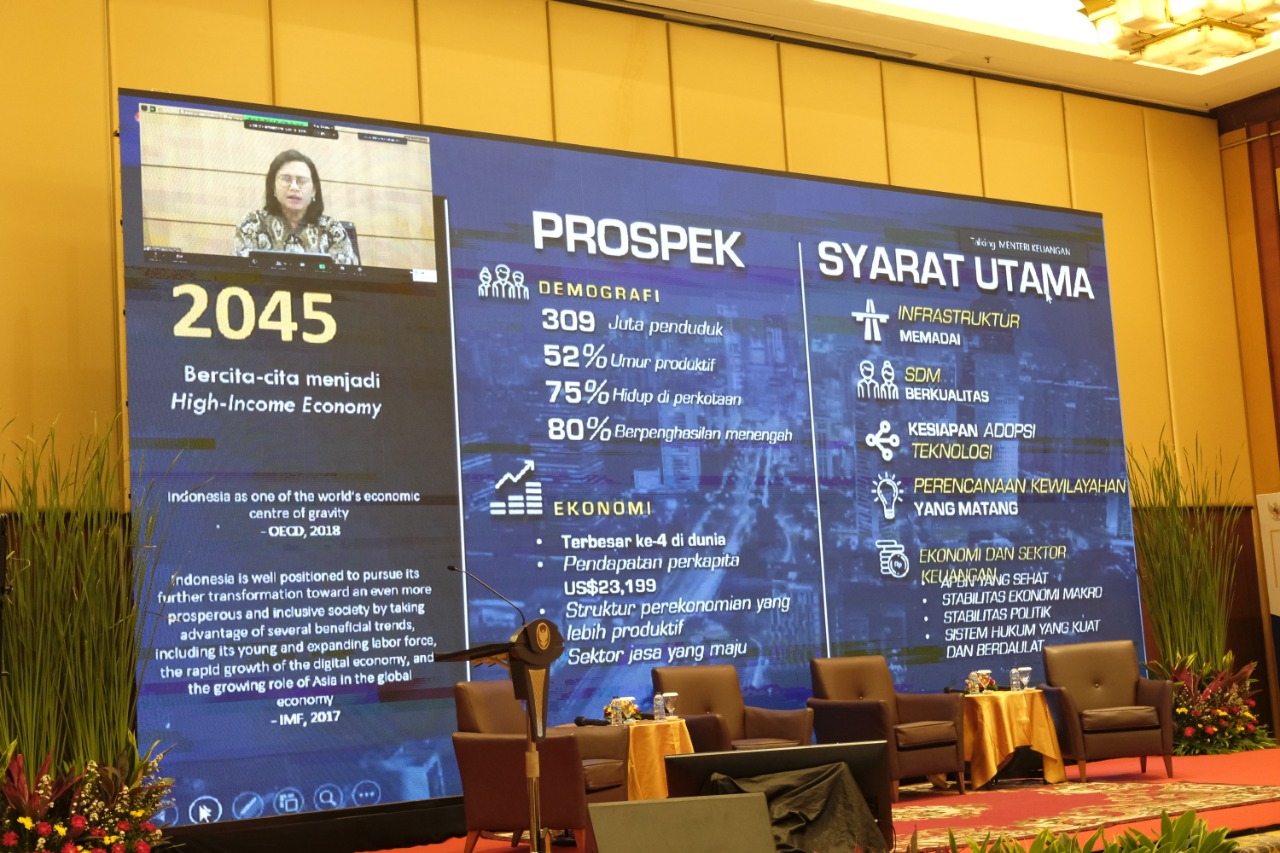Sri Mulyani: Tax Reform as Indonesia’s Effort for Ease of Doing Business

Presentation of Minister of Finance Sri Mulyani in a seminar “Absorb the Aspirations of the Implementation of the Job Creation Law on Tax”, held virtually on Thursday (19/11). (Photo: ekon.go.id)
Minister of Finance Sri Mulyani Indrawati said that redesigning and reformation of tax laws and regulations is necessary, including the Income Tax Law (PPh Law), the Value Added Tax Law (PPn Law), and the Law on General Provisions and Tax Administration (KUP Law), all of which are regulated in the Job Creation Law.
“In today’s digitalization trend, we need to make sure that we can collect taxes in the digital era. We also need to ensure that we can protect Indonesia’s tax rights and our taxation does not erode because people can enjoy tax avoidance and tax allowances, on the other hand we also need to make Indonesia’s resilience in the field of taxation competitive. This is what we are trying to include in the Job Creation Law on taxation,” said the Minister.
Some of the backgrounds in the ease of doing business cluster in taxation sector, are efforts to strengthen the Indonesian economy and encourage investment in the midst of the world economic slowdown in order to absorb the widest possible workforce.
“It takes a variety of amendments to various provisions of the law, including the aforementioned three tax laws, namely the Pph Law, the PPN Law, and the KUP Law in the near future. This is to maintain and increase tax revenue through increased investment, voluntary compliance, legal certainty and fairness in the business climate,” Sri said.
In the Income Tax Law, an amendment was made to make individual tax subjects clearer to provide clarification and certainty of the status of the tax subject, she added.
“If they stay in Indonesia for more than 183 days, then they become taxpayers or domestic tax subjects. For Indonesian citizens who are staying outside Indonesia for more than 183 days they can become tax subjects abroad under certain conditions,” said the Minister.
Changes were also made to the provisions of income tax for foreign citizens who become domestic tax subjects with certain expertise, but it only applies their income in Indonesia.
“We need an exchange of technology and higher knowledge to develop our skill and this will happen only if there is an interaction between locals and foreigners in their expert fields. Thus, to be able to attract them into our country, they need tax certainty,” Sri explained.
Amendments to the Income Tax Law also carry out in the elimination of Income Tax on dividends from within the country. Dividends and after-tax income from abroad are not subject to income tax as long as they are invested or used for other business activities in Indonesia.
“Income from abroad apart from Permanent Establishment will also be given incentives if they are invested in Indonesia,” said the Minister.
The Job Creation Law, she added, also includes various non-PPh objects, such as share profits business or the remaining profit from the cooperative business. This is to encourage people to create more cooperatives and reduce the number of cooperative memberships so that they can create more productive cooperatives.
“Non-PPh objects are also imposed on the Hajj Financial Management Agency (BPKH). For Income Tax Article 26 on rates on interest, adjustments are also made, and capital participation in the form of assets (inbreng) is not subject to VAT,” she added.
Furthermore, in the VAT Law, the Minister also mentioned several amendments that have been made, including people, especially small and medium enterprises, which have often carried out consignment in their business, are now not a category of taxable goods.
“There is a relaxation of the right to credit input tax for taxable entrepreneurs, the inclusion of identity number for buyers who do not have a tax number in the tax invoice, and regulations regarding tax invoices for retailers,” she said.
Meanwhile in the KUP Law, Sri explained that administrative sanctions for self-disclosure and untruthful actions of taxpayers have also been regulated. The Government has also rearranged tax administration sanctions and interest returns that are fairer, so that it can lead to a more cooperative and productive attitude from entrepreneurs. The Government tries to rationalize this to encourage a more positive and cooperative attitude, while will still carry out enforcement for taxpayers who do not comply.
“Certainty regarding taxation is one of the most important things for the business world and we are trying to create it to realize a more certain and better playing field. Once again I would like to convey that the job creation law is a real effort for Indonesia to take structural fundamental steps so that Indonesia can actually progress to become a more prosperous country with higher per capita income and more just,” Sri explained. (Ministry of Finance/UN) (EST/LW)








